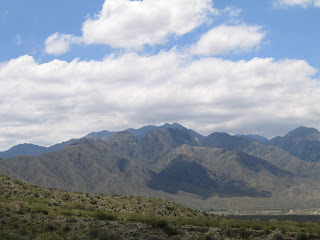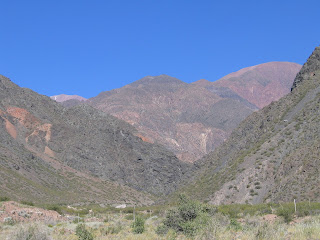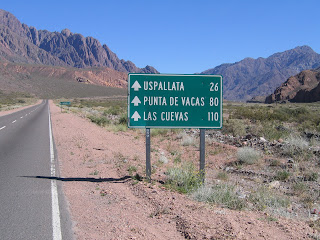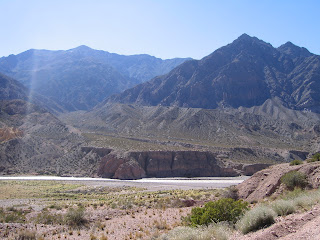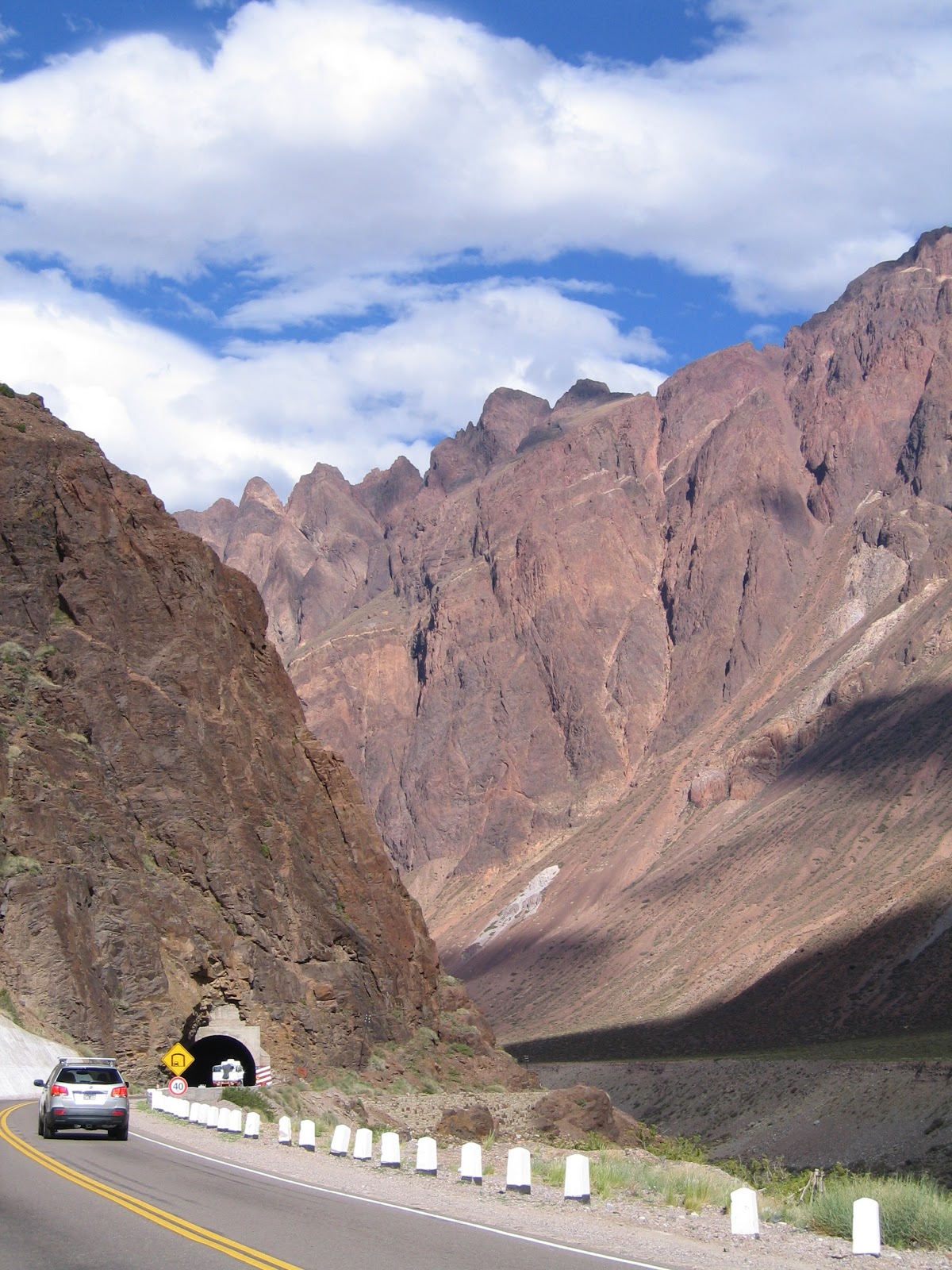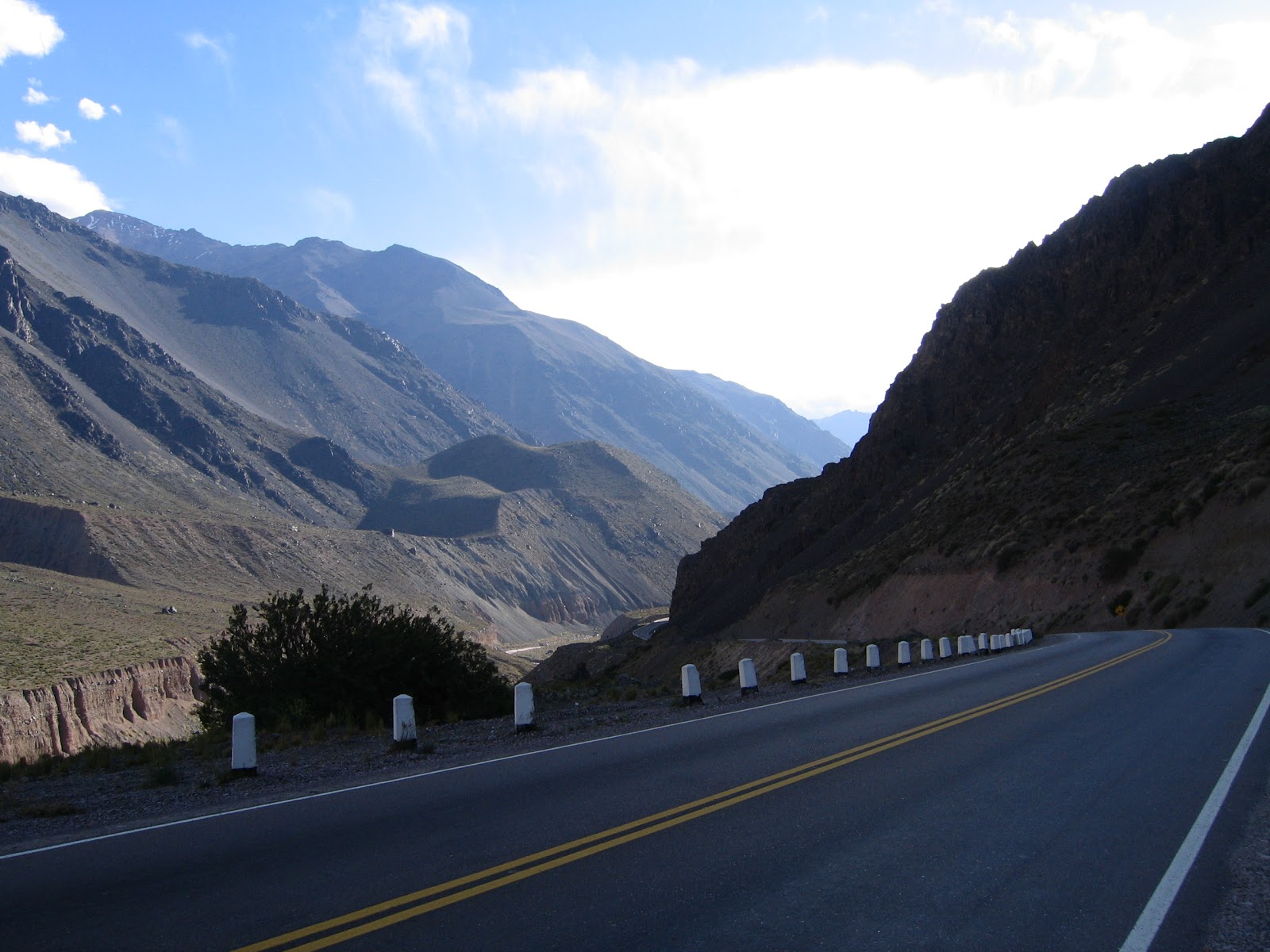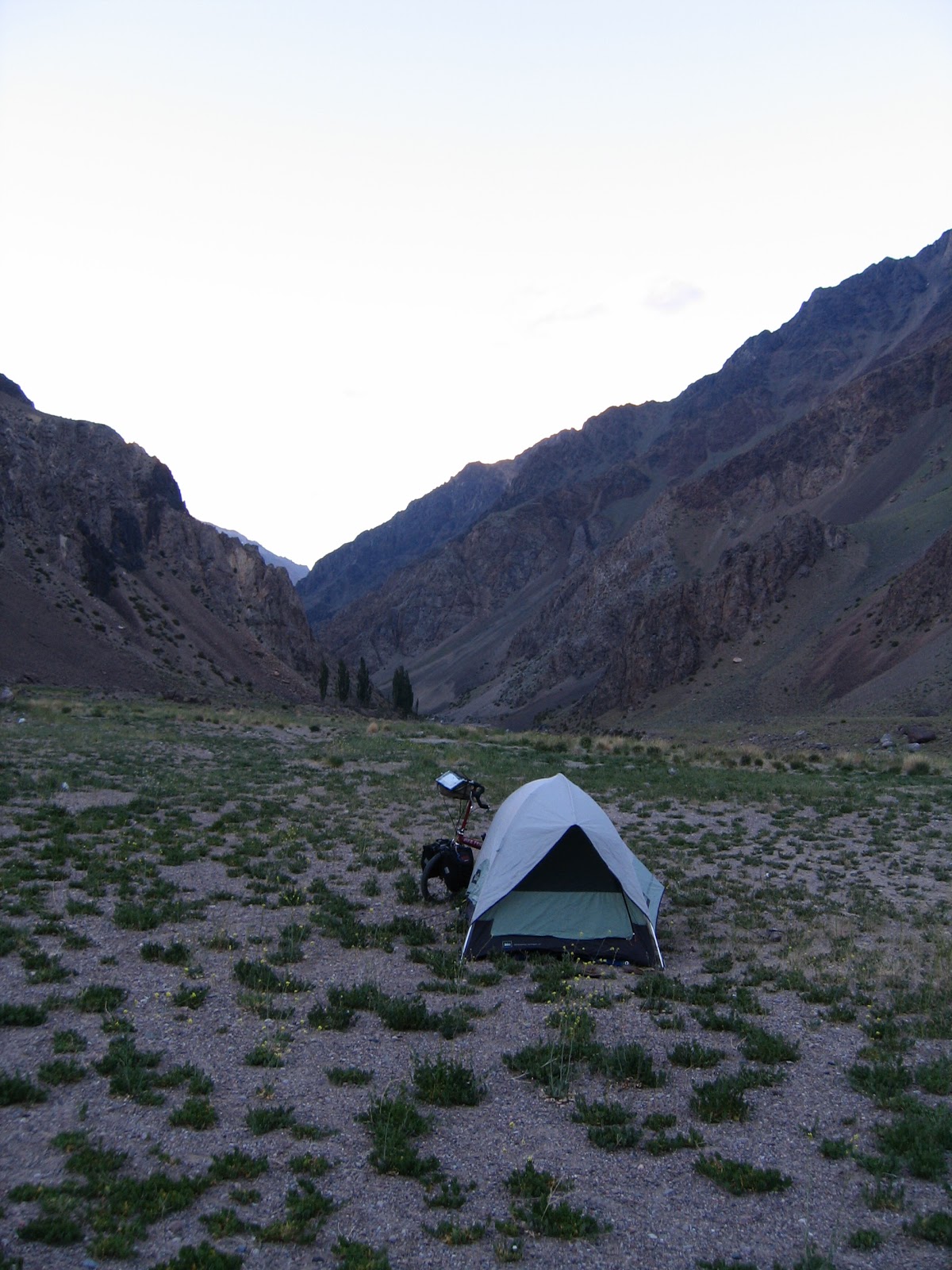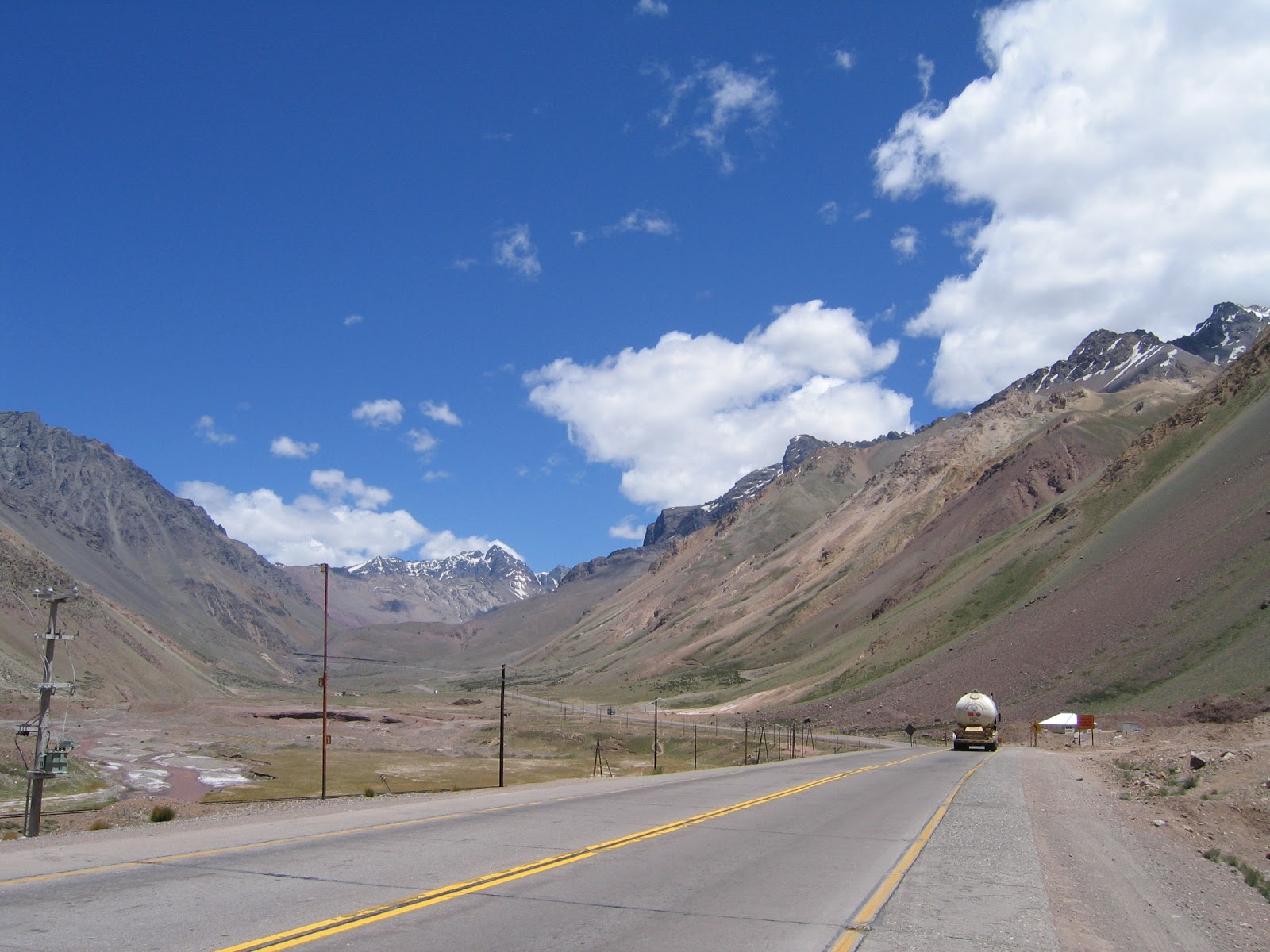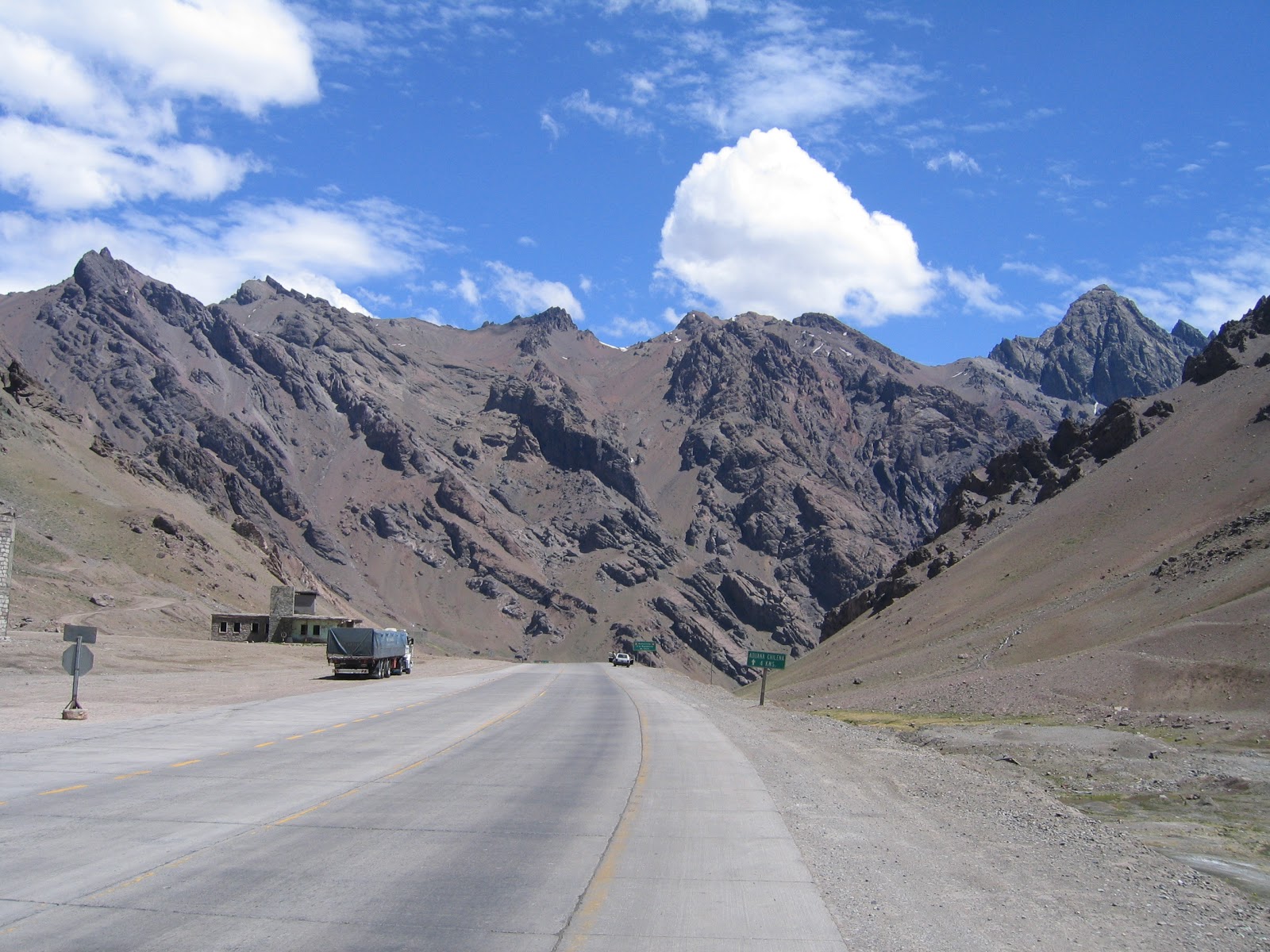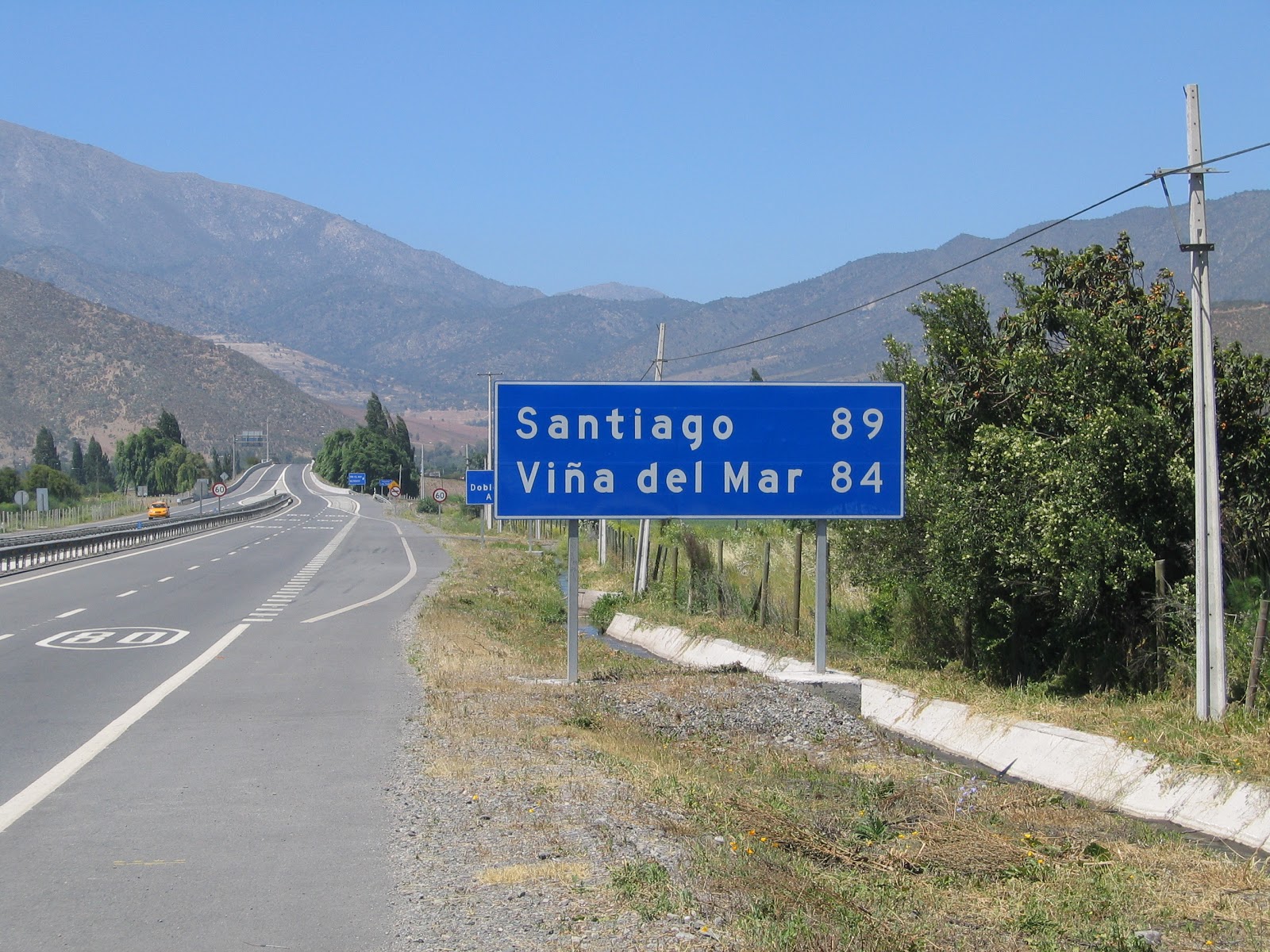I left Mendoza as the Andes
called loudly. I rode for three days and camped for two nights in the mountains
and one night in Chile
just outside the mountains. In the final two days I faced the strongest
headwind I had ever faced, and combined with steep climbing and altitude, there
were moments when I resigned myself to spending my life on the mountain
attempting to finish. On the last day as I rose higher in altitude, I would
receive mixed messages as to the distance to Chile. Some said 4km, some said
40km, some said the tunnel was 1km, some said the tunnel was much longer.
The next morning the ride to Uspallata was pleasant and sunny and no wind and cool
weather. I filled up my waterbag with two liters at a gas station, spoke with
the attendant about the ride to Chile,
and he wished me well as I left. Passing Uspallata I noticed many cabins for
rent, many hotels, and two hostels. It was a well-to-do tourist town in the
mountains, not too far from two popular starting points for the climb to Aconcagua. At a tienda I bought provisions and ate some
roasted chicken and three beef empenadas, which were excellent. I stray dog was
the recipient of some chicken scraps. As I pulled away, my rear tire was
flat—in several places metal wire had penetrated the tire. I pulled the wire out
with plies and patched and changed the tire. A woman from the store noted I
must have much money to travel as I do. I told her my costs were mostly
food—which in Argentina
has mostly been the case. I bought two apples down the road and then began a
slow climb. I was weary and not motivated to climb much more. Suddenly a
violent headwind hit me face on in the climb. I continued on, confused and
discouraged. Yet the Andes would change color, shades of green-tan,
red-chalk-yellow, severe peaks and snow-capped heights and snow melt running of
the face of height and worn silt of peaks crumbling down to the
river cliff canyons below and the sun shaping the shadows and reliefs as it passed
over the old mountains. The beauty encouraged me and I pushed on to the
wind. 5 hours later I had made it 51 kilometers and I stopped at Polvaredas to
fill up my 6 liter water bag from a faucet. The town was perched in a
fantastically—black and wet Andes to the North and a chalky brown crumble of the Andes to the South along a canyon and rushing river
below. The town’s two kiosks were closed as it was only 6 in the evening. I had
food though, and pushed on for a camp ground. 3km outside of town the winds
began again and I decided I had enough and looked for a place to sleep. I
spotted something promising off the side of the road, some bushes on sharp
rock, but as I was about to scout, a police on a scooter stopped to speak with
me. I told him of my journey and my want to camp and he told me I could return
to Plvaredas and he would offer me the police station’s yard or I could
continue 10km to Punta de Vacas, where there was a military compound and
camping. I rode a weary and windy climb to Punta de Vacas but I was in great
luck—a provincial park, popular for those choosing the more difficult,
technical approach to Aconcagua. Christian,
from Mendoza, a young man in his mid-twenties, has been working in the parks
for 2 years, his last in Punta de Vacas. He offered me the land in back of his
cargo container shelter and asked of my journey and then wished me well. I ate
two cans of beans, crackers, mayonnaise, and cookies for dinner.I slept well, awakened a few times during the night as the wind seemed as if it would tear apart the tend. Could the wind continue in the night and even early in the morning?
Christian,
the young man at the provincial part station here, said that Chile is “all mountain and sea.”
The wind
began immediately and ferocious. I said goodbye to Paulo and Chistian at the
park and rolled past the military base. I rose high into the Andes
and never was there a moment when the wind did not hit my face. You could start
as early as you wanted in the morning: the wind would be there. The wind was
there at night as it blew my tent. I would climb for the day in the sun and
wind and mid-day found a small pueblo that was hosting a downhill mountain bike
race. The riders were well-equiped and the town was a popular ski attraction in
the winter. I drank coffee and ate bread and the hosts were compliant but not
friendly. I rode on to the next town and it was filled with tourists, most of
them from Argentina
and Chile. I asked a dim-witted man for a tienda and he misdirected me. When I
found the tienda, I spotted the dim-witted man inspecting my bike. I snapped at
him that we were standing in front the of the tienda. He had no idea what I was
talking about. I filled up my 6 liter bag as I had no idea as to the duration
of the climb or the severity of the wind. 20km? 50km? 100km? It didn’t matter.
If I had 2 days of water and 2 days of food, I could make it to most places in
most conditions. As I continued to climb the wind grew more fierce. Several
times I could not stay on the road and had to put a foot down. But as I
continued to climb the cheers and the honking increased in frequency and
duration. The wind was violent and in my face and forcing me to climb out of
the saddle in my lowest gear. I was riding at about 8km per hour. Yet I had
fans, and I could not let them down. I saw Aconcagua in the distance and I
thought of the first men to have climbed the peak at nearly 7,000 meters and of
course there was wind, of course the climb was steep, of course the air thinned
at altitude. I had just never encountered such a fierce headwind in my life,
and thought it comical that it happens as I try to push 40 kilos of gear and a
circus bicycle up a 3,900 meter peak into another country. The treeline
disappeared and snow revealed itself on the proximate peaks. I stopped beside
an old mining facility and opened a can of beans and ate with mayonnaise and
crackers and mate. This meal gave the legs great life and I continued on my
attack. Soon I reached a tunnel. Was this the
tunnel, the tunnel that required a dismount and transport in a police truck? I
stopped outside the tunnel to snap a few photos and a police truck stopped
beside me. No, not this tunnel, he said, this one was only 800 meters. I could
continue to ride if I liked, but the 3000 meter tunnel to Chile, that would require me to
throw my bike in his truck. I rode the 800 meter tunnel and waited for the
man. He arrived with a companion and we threw my bike in the truck and we rode
the tunnel, pockmarked with paving stones and uneven surface, I was happy to be
in the truck. One man was relatively local, from around
the Andes. The other man lived near Mendoza but had lived in Ushuaia for many years and had
seen battle with Great
Britain during the battle of the Islas
Molvinas. He had not been back to Ushuaia for 6 years but he still had family. When we emerged we were in Chile and they left and I rode a
steep 4km descent to the immigration and filled out three forms and had my bags
sniffed for contraband. I descended steep switchbacks for 30km and in the first
10km felt like the yellow jersey as honks and cheers filled the cold air of the
Andes. A small tear fell from my left eye.
I found a
small restaurant and the men were watching the game. I ordered an empenata and
it had raisins and olives and eggs and tomatoes and was served with a spicy salsa
and cold beer. The game ended and I rode 6km to a campground, where Francecsa and
her 4 year old son, Bastien, gave me a fine soft green space flanked by steep
rocky peaks and a river.
He had
four fingers on his left hand, his pinky merged with his ring finger.
He was a
salesman. He was slightly portly and swollen with a cheap white shirt, a cheap
black nylon suitcase, and his tie on the table. He gave me his tie, his rosary,
and a plastic emblem of a local virgin.
He told
me never to use the term “nativo,” which is used in Argentina and means “originally
from a city.” He told me that all Chileans are native and in the south I’d be
punched if I used the term.
The other, old
man next to me was Peruvian and drank wine and had no teeth. He bought us a
liter of beer and then left. The other men jeered me, the gringo, as they drank
pitchers of wine. They poured me two glasses of their wine and we drank beer
and wine and Leo told me of his tribe in the south. I could follow some of the
history. Mayans
are assassins, he told me. Aztecs
are assassins. Hitler. USA assassins, puta madres. Japan
overfishs and robs from Chile. USA robs from Chile.
El pueblo unido, jamás será vencido. He was a communist he said, but communism was practically illegal. We chanted again: El pueblo unido, jamás será vencido. Apparently his tribe was not among the assassins. His tribe and his philosophy was of the pueblo. The pueblo, you see, is where the truth is, is where the truth lies. Politics are fake, all lies, all robbery, all fucking bitch mother ass, he insisted. He looked in my eyes and told me I was an angel. I began to worry. He gave me his rosary, tie, and saint emblem. I went to my room and returned with the chimarrao from Porto Alegre. Leo was grateful for the chimmarao and told me he would guard it closely and put it in his suitcase. The Peruvian laughed—this wasn’t quite the “intercambio cultural” that Leo had expected: something Chilean for something Gaucho and Brazilian. But it was all that I had. I couldn’t give him my watch and I needed my cycling gear. The chimarrao was useful but I used my water bottle to drink mate. All I needed was the Brazilian bomba. We split another liter of beer and Leo grew more vivacious and pulled out his smartphone and played Chilean, Argentinean and American hairspray metal and put the phone close to my ear and ask my to translate the American music. He told me again that I was an angel that was there to save him. At that point I was wearing his tie and his rosary.
As the night wore on, Leo asked if I was hungry and we stumbled out the barren wooden bar and walked about the city. We happened upon a café with an expensive menu. But it had the German beer that Leo had spoken about from the South, the German beer, as even though Leo was a man from a tribe he had German blood and liked German beer.
Something turned sour just then. Leo recommended a Mexican plate and I
was perplexed. Why didn’t we go to a cheap spot for empenadas or a parilla for
some grilled meat? Why were we in a tourist trap? He mentioned that I might
like a burger and fries instead. Why was he souring? Perhaps it was the end of
the day, perhaps he had too many beers. The food came and it was fine and I was
famished and so began to eat. I split the food and put half on his plate and he
would nibble and then put the food on my plate. He chain smoked and called a
friend. As I will still eating he put his plate on top of the uneaten food and
said we would go to his friend’s parilla. I was perplexed—wasted food and a
huge bill? I paid and we walked towards his friend’s parilla at which point he
said we would get on a bus to Dos Rios, one hour away. It was 9 o’clock and
dark. I told Leo that it was out of the question, that I had to call my mother
and that I had my belongings in the hotel and could not travel at night just to
eat at his friend’s parilla.
He walked with me angrily back to the inn. We sat
down and I told him we would drink another beer and I would walk him to the bus
station. I hadn’t realize he lived an hour away. He looked me in the eye,
drunkenly, and said: “Quiero te pegar.” In my experience this word means three
things: to fuck, to surf, or to punch. There were no waves, and the remaining
two choices required me to stand up in rage and challenge my confused or angry
friend. I asked in rage: What do you mean, pegar, huh? Leo’s face whitened and
he told me to sit down. I told him I was a man who liked women and I motioned to
a large bottle to break over his head. He seemed confused. He backpedaled and
told me that no, his friend wanted to pegar. Again, I motioned to the bottle.
His friend wanted to fuck or fight me? I drunken man walked by and I stopped him. I asked him, in his opinion, what was meant by "pegar." Apparently it mean punch, but he put his arm around me and patted me on the back and told me to calm down. I turned to Leo in deeper rage. He whitened a lighter shade. I told him I was there to make friends but was
prepared to fight. What did he want? I was wearing the man’s rosary. I calmed
down a bit and told him to stand up. I have him a hug, told him he was my
friend, and I went to my room to get my fighting knife to put in my jeans. Leo walked away to drink more. A few minutes later I heard a knock at my door. It was
Leo, and he had a young woman with him, Teresera. He left her at my door and I
spoke with her clumsily. Your friend is strange, I told her. She agreed. In
politeness I told her we could drink later with her friends but for the moment
I was occupied.The door to my room had no lock but two rings for a padlock and I locked my door with my padlock and proceeded to the internet and telephone booth tienda.
I remember one broma from Leo--Yo estaba en los Estados Unidos desde hace veinte años, y yo no era feliz. Yo estaba en Chile durante 2 semanas y tuve la sífilis. It rhymes. This is why one laughs.
I remember one broma from Leo--Yo estaba en los Estados Unidos desde hace veinte años, y yo no era feliz. Yo estaba en Chile durante 2 semanas y tuve la sífilis. It rhymes. This is why one laughs.
I used the internet and called my mother. I then walked the streets and bought a can of beer. When I arrived back at the inn Teresera and the old woman were waiting
for me with two liters of beer. Teresera asked me if I wanted beer or wine, and
I said wine, and the old woman went into the kichen for a half liter of wine in
a pitcher and a glass. The three of us drank until
midnight. I told them about my cycling and the mountains but Teresera kept
asking me if I was lonely and if I wanted to spend the day with her eating
empenadas and seeing the town. I thought of another night in the windowless
shithole for 10,000 pesos with the crazy fingerless Leo and and the dunk
belligerent men and the heavy cigarette smoke and the chance my belongings
would be gone at any moment. I took Tereresa’s hand and stroked it. I told her
I would go in the morning and that I needed liberty. She looked away from me.
She had been waiting for me for two hours and had just killed 2 liters of beer
that she had intended for the both of us. She got up and could barely stand. She
stumbled to the door. I went to my room and latched the door.
I awoke
early in the morning and was happy to be free of the dark prison. The 130km
ride to Vina del Mar
was mostly flat and tranquil with many vineyards and flanked by mountains with
a slight wind and climb at the end. I ate the two finest empenadas of my life
as a local woman listened to excellent Chilean rock music. I arrived in Vina del Mar and it was
heavily touristed but pleasant, reminding me of Nice.
Urs, Gustavo, and a Frenchman who lived in the hostel.
Gustavo negotiating with the Frenchman, Mexican style.






